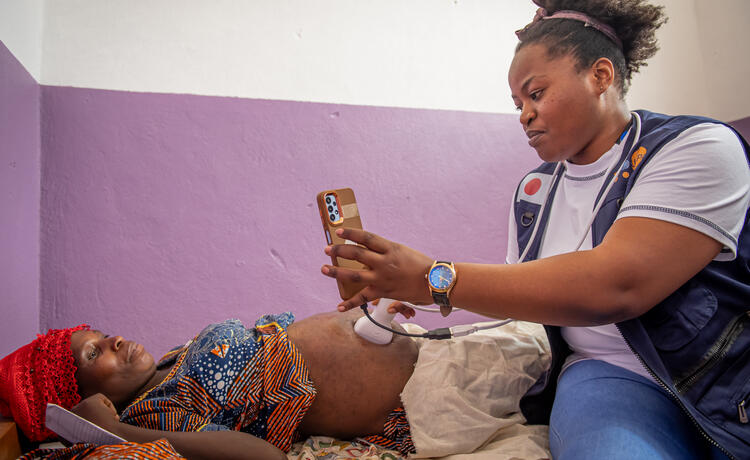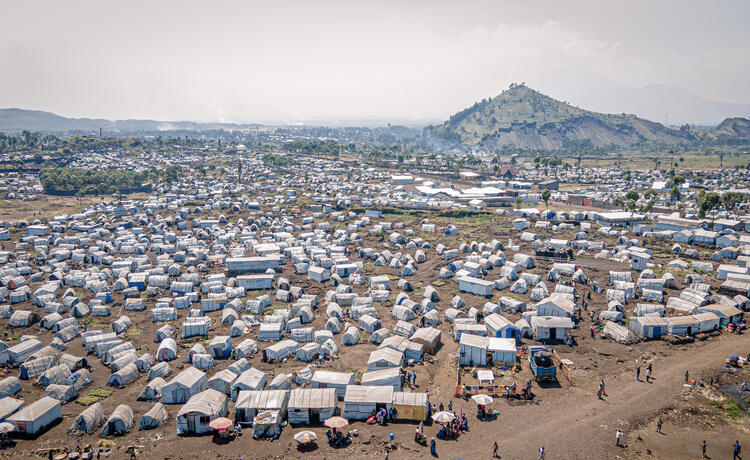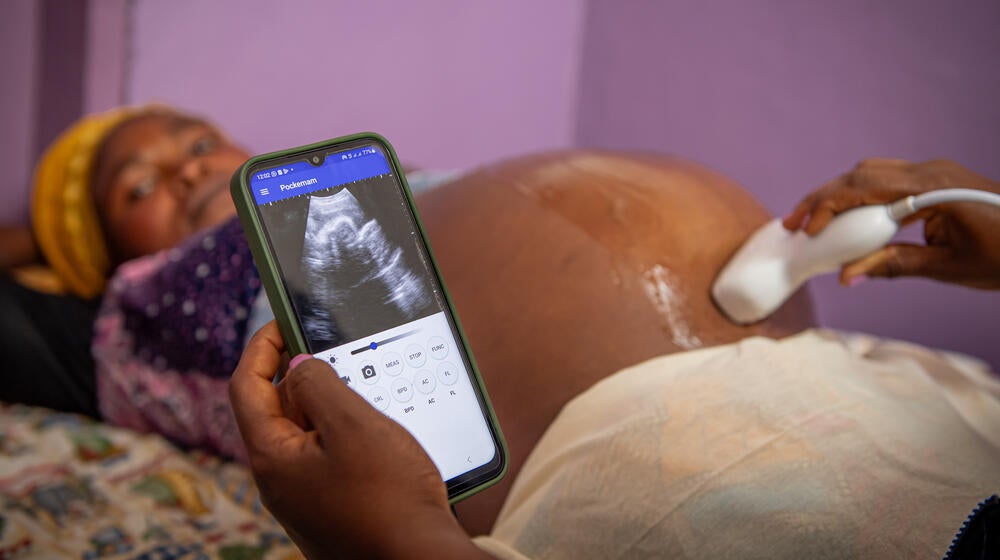NORTH KIVU PROVINCE, Democratic Republic of the Congo – “Most of the women here have never had an ultrasound scan in their lives – even though on average they’ve already given birth more than five times,” said Charmante Sibamza, a midwife in Nyiragongo, in North Kivu province.
More than 20 pregnant women are waiting on benches at the Kanyaruchinya health centre to see one of two midwives for a consultation. There is a sense of enthusiasm among the women – the midwives had earlier held a group session to explain the importance of antenatal consultations, and specifically of a new mobile ultrasound scanner.
This is my seventh childbirth, but the first time I've had an ultrasound. I'm delighted to learn that I'm going to have twins, as well as being told when I'm due.
“This is my seventh childbirth, but the first time I've had an ultrasound,” said 35-year-old Anita Bosco, watching the images on a mobile phone screen intently.
“I'm delighted to learn that I'm going to have twins, as well as being told when I'm due. This will allow me to prepare better for the birth of my babies… I'm going to have to look for more resources because the family is growing fast!”
Ms. Bosco’s husband recently lost his job transporting goods by bicycle, as soaring insecurity from the crisis currently gripping the Democratic Republic of the Congo has made it too dangerous to move around. And given her advanced pregnancy, she can no longer support the family selling coal by the roadside as she used to.
Like many in her community, the situation has left her highly vulnerable, and the free services provided at the centre, which is supported by UNFPA, the UN sexual and reproductive health agency, offer some rare relief.
In the eastern provinces of Ituri, North Kivu and South Kivu, ongoing conflict has forced some 5.5 million people to flee their homes, 220,000 of whom are pregnant women with scarce access to even the most basic health care – a situation that can easily turn life-threatening.
Tailoring humanitarian health care
The Kanyaruchinya health centre is located near the makeshift Bujari camp on the outskirts of Goma, set up for people displaced by the surging violence in the east of the country. Sexual and reproductive health services, including emergency obstetric care, family planning and post-rape support, are provided for women and girls from both host and refugee communities, most of whom have been repeatedly uprooted from their homes and have severely limited income.
The ultrasound scanners are a simplified version of the more advanced machines generally seen in maternity wards: Operating from a mobile phone connected to a probe, the lightweight, portable device is well tailored to precarious humanitarian contexts, which often have scarce, unreliable electricity and offer poor if any access to health facilities.

One of 15 skilled health-care workers at the Kanyaruchinya centre, Ms. Sibamza, uses the ultrasounds in health facilities and at three mobile clinics set up so far by UNFPA in displacement sites in North Kivu province.
“This will contribute to reducing maternal deaths,” she explained. “The machines help to detect possible problems during pregnancy and childbirth, and to make appropriate decisions.”
Nikamiye Twiyombe, 35, is among those who fled within the country; she abandoned her home in the village of Kibumba and walked eight hours to reach the camp in Kanyaruchinya, where she’s taking shelter along with tens of thousands of others.
For Ms. Twiyombe, having access to technology like this in the depths of a cramped displacement camp is a welcome source of solace.
“This is the first time I've been examined with this machine,” she said. “They showed me that the baby is moving, that it's alive, and they told me when I'm due in October.”
Reaching the most vulnerable women and girls
Funded by Japan, the six ultrasound machines have performed more than 600 scans since their launch in June 2023. In the first half of the year, the health centre has received almost 2,200 women for antenatal consultations and recorded more than 1,100 births assisted by qualified staff.
“I'm really happy,” Ms. Twiyombe told UNFPA. “Pregnancy is a time of uncertainty, but with this machine I'm reassured, because I saw the baby move with my own eyes.”
The Kanyarucinya health centre is helping to bridge a dangerous gap in maternal health care in the Democratic Republic of the Congo, especially in areas ravaged by conflict. The country already had one of the highest rates of maternal deaths in the world before the current crisis, with three women dying every hour from pregnancy and birth-related complications.

UNFPA remains on the ground working to improve conditions for millions of women and girls, and has launched an appeal for more than $18 million until the end of 2023 to strengthen reproductive health services and prevent and respond to the eruption of sexual violence in eastern provinces.
To date, only one fifth of the appeal has been funded.


